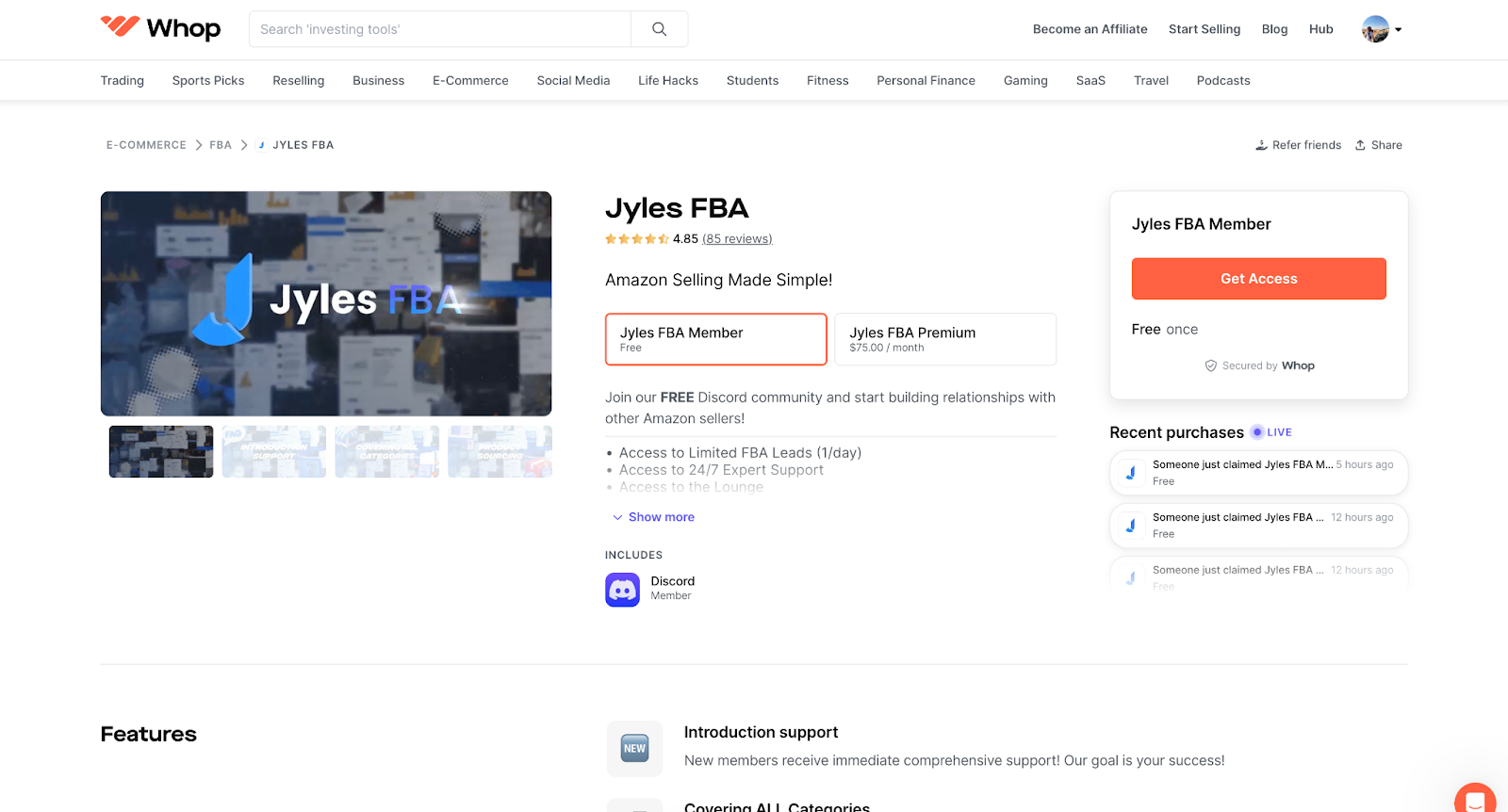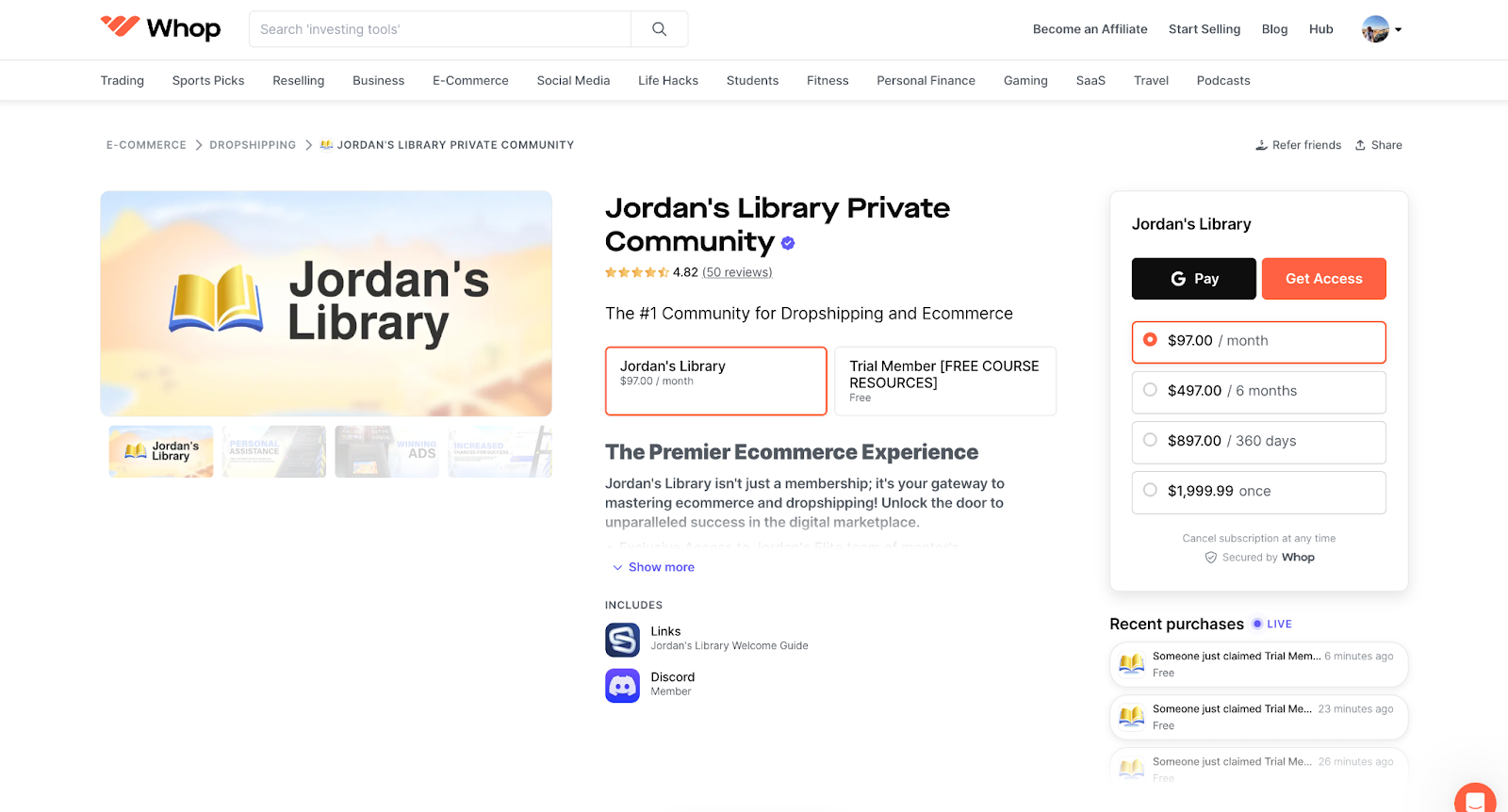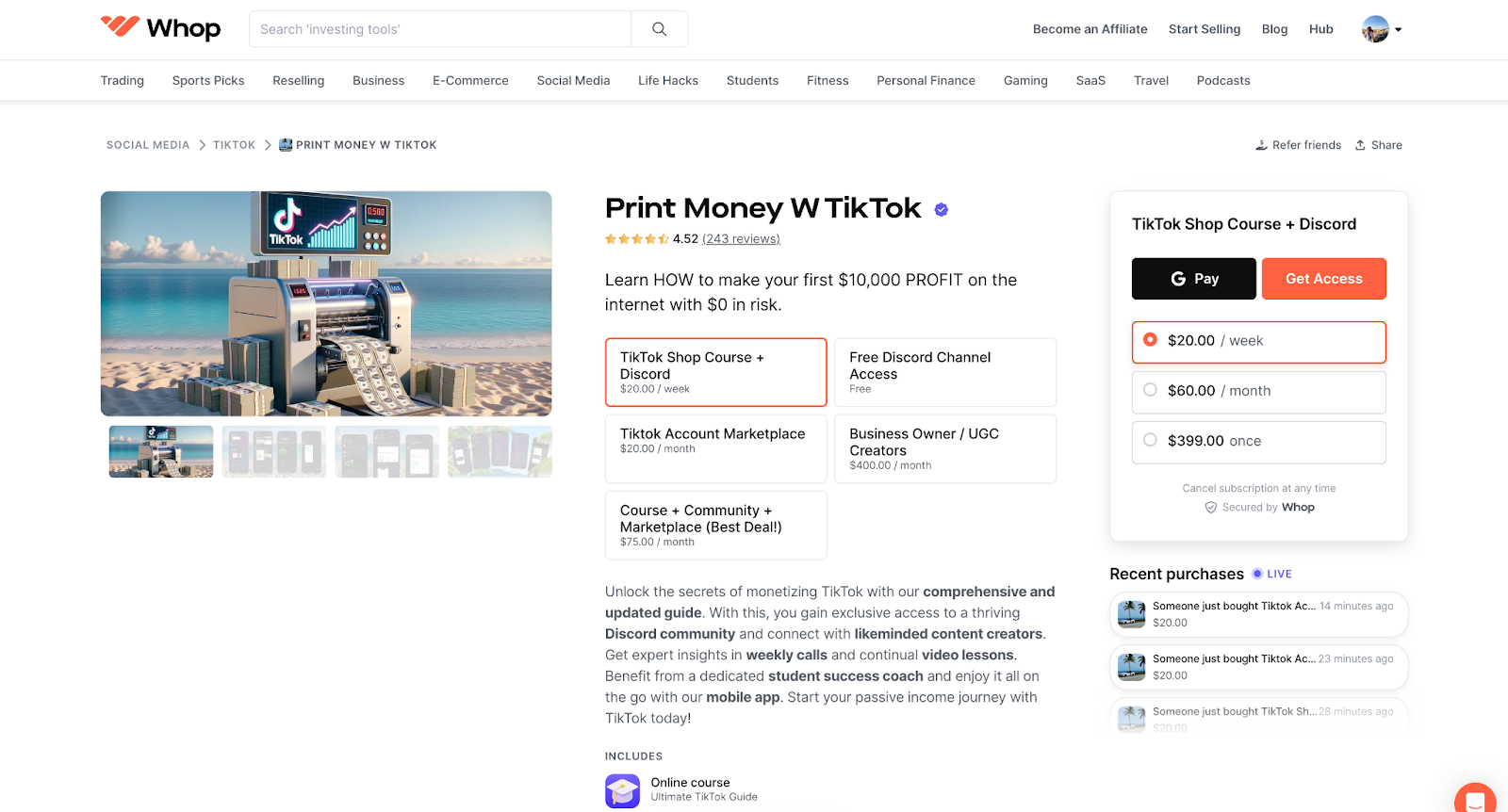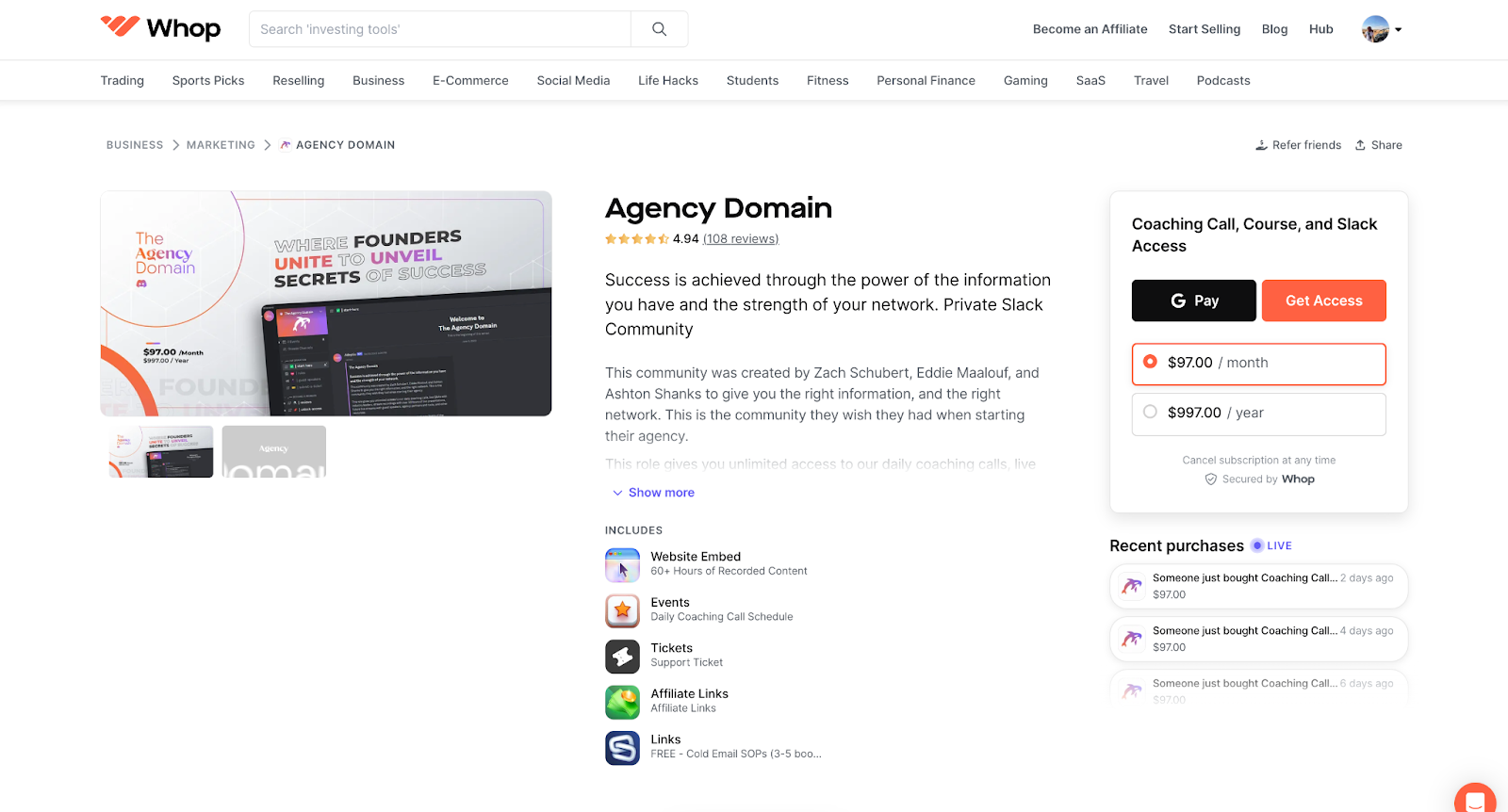What is an ecommerce agency, and why should you consider joining one? Uncover the answer to these questions in this article, along with 13 ecommerce agency ideas that you can start today.
Key takeaways
- Ecommerce agencies require almost no startup capital, making them one of the lowest-risk business models to launch.
- Choose an agency niche that balances your existing expertise with room for personal growth and client fit.
- Service-based agencies limit scalability since your income is constrained by available time and client demands.
Starting a service-based business that helps ecommerce brands is one of the best ways to start making money online in 2026. Depending on your resources, skills, and passions, you can most likely find a business idea to start that will provide real value and help you make a solid income.
In this article, we’ll cover what an ecommerce agency is, why you should consider starting one, and real-life examples that are best for certain types of people.
What is an ecommerce agency?

An ecommerce agency is simply a business that offers a service to online brands and software products. These businesses can be small one-person operations servicing just a few brands or massive organizations with hundreds of employees and clients, and they can do everything from email marketing to search engine optimization.
Ecommerce agencies help digitally-native brands make more money.
Most ecommerce agencies will be in the digital marketing space as that’s the best place to start for beginners, and experts who can prove their value in growing revenue are able to capture a large piece of the upside.
Why start an ecommerce agency?
When starting any type of business—especially an agency—you have limitless options. Here are a few reasons why you should start an ecommerce agency compared to any of the other agencies you could start.
Ecommerce is growing rapidly
Both during and after the COVID pandemic, the ecommerce industry has been getting bigger and bigger. Global revenue for ecommerce was predicted to be $6.3 trillion in 2024.
This means that more startups are being created, digital-first brands are scaling, and even established companies are finding ways to sell things online. The result? More opportunities to provide services to more clients.
You can apply almost any skill
Starting an online business requires many different components. You need a website for people to buy things at (like Shopify or Whop), you need a way to find customers (typically through ads), and you need creative assets to support marketing campaigns, among many other things.
This presents the need for developers, designers, photographers, videographers, copywriters—just about every type of professional!
If you’re able to do any of these functions or learn quickly, then you can create an offering from it to sell to people.
At Whop, we have dozens of courses that can teach you how to do this must faster than learning on your own.
You work with successful businesses
Because your clients are brands or software companies, chances are that they’re pretty successful if they need the extra help to grow their business. This means that you get to work with some of the smartest people and can also learn from them.
You’re also not selling directly to consumers, which is arguably a lot harder than selling a business-to-business product because there’s more competition and more education when selling something to an individual compared to a sophisticated founder who knows exactly what they need for their operation.
There’s almost no risk
You really don’t need any capital or significant resources to start an ecommerce agency. You don’t have to spend tens of thousands of dollars on inventory, you don’t need to create a shiny brand, and you can acquire your first clients through free channels like cold email or direct messages.
Ecommerce agencies are one of the lowest-risk, easiest-to-start business models.
It’s fun!
Most of all, ecommerce agencies are exciting to be a part of. You get to work with consumer products across many categories such as skincare, food and beverage, and apparel, or cutting-edge technology like AI software and media.
Helping get cool things into the hands of more people will make the work you do at your ecommerce agency all the more rewarding.
But, keep a few things in mind:
- Time: With a services business, you’re limited by your time. You can only make as much money as your schedule allows. Agencies aren’t the most scalable business model.
- Clients: Don’t fall under the impression that you don’t have to answer to anyone. With agencies you still have customers to serve and report to!
- Competition: The agency space is highly competitive. Every day, experts are leaving full-time jobs and starting their own businesses, so you’re competing with the best of the best.
The 13 best ecommerce agency ideas💰
Ready to start your own ecommerce agency? Here are some of the top ways to get started:
1- Paid ads
Paid ad agencies are one of the cornerstones of the ecommerce industry. If you know the ins and outs of setting up an ad campaign on a network like Facebook or Google, then running ads for other businesses is a great place for you to start. Every business needs traffic, so good paid marketing agencies are always in demand.
Best for: Digital marketers who have experience with ad platforms.
Monthly overhead: $100 to $300
2- Copywriting
Do you have your way with words? Copywriting is the process of writing sales copy that converts potential customers into paying customers. You can offer services such as writing ad captions, landing pages, and even video scripts.
Best for: People who understand human psychology and can write persuasively.
Monthly overhead: $0 to $100
3- Ad design
Ads are the lifeblood of ecommerce. If you can create eye-catching graphics and thumb-stopping videos with tools like Canva, Figma, or Illustrator, starting an ad design agency may be for you.
Best for: Skilled graphic designers with a basic understanding of advertising.
Monthly overhead: $100 to $300
4- Blog writing
Almost every company online has a blog—and they need good writers. Blog writing is great for individuals who can take topics or abstract ideas and convey them in an in-depth article. Blog posts help businesses generate organic traffic through search engines, so quality writing is a must have for any successful site.
Best for: People who breezed through English class and are comfortable writing long-form content.
Monthly overhead: $0 to $100
5- Shopify development
If you find an ecommerce brand, chances are that it’s built on Shopify. Shopify is one of the leading platforms for companies selling physical products online. While they have pre-built templates available, brands still need technical help to create engaging user experiences. And since it’s a more advanced job, you can charge higher rates if you are good at programming.
Best for: Tech-savvy coders who have experience building and editing websites.
Monthly overhead: $100 to $300
6- Amazon FBA consulting
There are plenty of Amazon sellers out there so the competition is at an all-time high. Help them with things like product research, pay-per-click ads, and product listings.

Best for: Experienced Amazon FBA sellers who are able to diagnose problems for other sellers.
Monthly overhead: $100 to $300
7- Dropshipping consulting
Dropshipping is still a great opportunity and there’s an abundance of entrepreneurs looking to scale their business. Similar to Amazon FBA, dropshippers need help creating graphics, running ads, and finding winning products for their store.

Best for: Experienced dropshippers and brand owners. Monthly Overhead: $100 to $300
8- Influencer marketing
Like the idea of working with creators and social media, but don’t want to be the star of the show? You can help ecommerce brands find influencers and negotiate deals without ever having to take a video of yourself. Influencer marketing is one of the most important ways for brands to grow because it typically doesn’t cost them anything other than the cost to send products. So, as Facebook advertising costs rise, influencer marketing becomes a crucial part of these businesses’ growth.
Best for: People with a deep understanding of social media and the creator economy.
Monthly overhead: $100 to $300
9- Affiliate marketing
Like influencer marketing, affiliate marketing relies on a wide range of creators (called “affiliates”) to promote a brand’s product. These affiliates could be social media stars, YouTubers, or blogs. You can be the liaison between ecommerce business and affiliates and charge a flat retainer fee or percentage of sales.
Best for: Affiliate marketing experts who can negotiate commissions and manage relationships.
Monthly overhead: $100 to $300
10 - User generated Content
User Generated Content (UGC) is used by consumer brands for organic content and paid ads. Anyone can make it as long as you’re confident in front of a camera and can shoot clean product shots with engaging storylines.
Best for: Complete beginners who only have a smartphone and basic editing software.
Monthly overhead: $0 to $100
11- TikTok shop creator marketing
TikTok Shop is widely hailed as one of the biggest opportunities in ecommerce right now. Help brands capitalize on the new functionality from one of the world’s biggest social media platforms by setting up their shop and connecting them with creators who can promote their brand.

Best for: If you spend hours a day on TikTok and understand virality, TikTok Shop is a great thing to specialize in.
Monthly overhead: $0 to $100
12- Email marketing
Email isn’t dead! Help businesses convert customers and retain past buyers with email flows and campaigns. Email marketing is a blend of copywriting and technical know how—combining the two provides real value to brands.
Best for: Copywriters who are able to set up logical email sequences that drive conversions.
Monthly Overhead: $0 to $100
13- Search Engine Optimization
Search engine optimization (SEO) is the process of properly setting up a site and creating articles to drive traffic from search engines like Google and Bing. Rather than spending money on ads, SEO attracts visitors to websites from an existing pool of people asking questions and looking for solutions to their problems.
Best for: People who have technical expertise and understand how search algorithms work.
Monthly overhead: $250 to $500
How to choose an ecommerce agency niche
Here are some things you should keep in mind when deciding what type of business to start.
Your talents, interests, and abilities
Make sure that the business you start strikes a balance between something you already know how to do while also helping you grow personally. If you’re not an expert in a field, it’s challenging to help another business do that thing.
But, you don’t want to be bored because you’ve already been doing something for so many years. Try to find a vertical that you’re confident you can figure out but that also stretches you intellectually.
Your passion and clients’ industry
You want there to be a good fit between what you personally find interesting and what your potential clients are doing. If you’re really good at running Facebook Ads for supplement companies, then doing email marketing for a new AI design startup probably won’t work out too well.
The good news is that you can easily find a business model that both plays to your strengths and has customers that can benefit from your experience.
Your goals
Why are you starting an ecommerce agency? To make money! While the potential for each type of agency will vary by your skill level, the size of your prospects, and how much value you provide, it’s safe to assume that you can make a decent income for yourself.
The more value (revenue) that you can provide, the more money you will make. Things that have a high potential for scale, like paid ads or Amazon FBA, will allow you to make the most money but are harder to become an expert in.
Simpler tasks like creating videos or copywriting are easier to master and get new clients, but are more commoditized so the earning potential is lower.
Figure out what will be the fastest agency idea to get traction with, and then go from there. You don’t want to try to get rich by aiming for the stars, when good money could be more accessible.
Start your ecommerce agency or community with Whop today!
As you can tell, starting an ecommerce agency is easier than you may have initially thought—and you probably have the skills to do it right now.
Ecommerce is a growing industry and it’s not going anywhere, which means that the potential is unlimited. Especially with the advent of AI and new social media platforms, new business models and needs are arising all the time.

If you’d like to learn from some of the best agency owners in the world, then check out Agency Domain on Whop. It’s led by Zach Schubert of Qera Marketing (7-figure SEO consultancy) and Eddie Maalouf and Ashton Shanks from BAD Marketing and has a strong community of like-minded professionals to help you take your business to the next level.
An alternative to agencies: Niche communities
If you decide that working with clients one-on-one isn’t the route that is best for you, then consider starting your own community on Whop. Rather than selling your expertise to other businesses and implementing the work yourself, you can use the same skills you already have to teach others. This means more potential customers and less stress for you!
The Whop Hub feature allows you to create different digital like courses, video calls, ebooks, and more. Plus, you can create your own community in your Hub by adding Chat and Forum apps. No need for any other platform - Whop has it all. Use all the information you’d incorporate into an agency offering, and rather than working with individual clients, work with hundreds, if not thousands, at a time by sharing your expertise and advice in a group setting!
Why you should trust us
Joe Niehaus is a freelance content writer at Whop, specializing in ecommerce and digital marketing. Throughout his career, he has worked with multiple publishers, ecommerce brands, and agencies in areas like copywriting, blog writing, affiliate marketing, and more.
This article is a compilation of his personal experience, research on industry trends, and consultations with leaders in the space. You’re getting information about starting an ecommerce agency from someone who currently works with some of the most experienced experts in the space, not generic information available online.
Ecommerce agency FAQs
The answers to some of the most common questions about ecommerce agencies.
How do I start an ecommerce agency?
Starting an ecommerce agency can be broken down into three simple main steps (although there are many tasks within each step):
- Decide on your niche: Do you want to run ads? Do you like graphic design? Decide on a service that you enjoy doing and are confident in your ability to perform well.
- Find customers: Once you’ve honed in on the product you’re going to offer, it’s time to find people who are willing to pay you. This can be done through simple tools like Google searches, LinkedIn discovery, and cold emailing businesses.
- Fulfill your orders: Now that you have a client, you’re ready to do the job! Doing things well and communicating effectively are the keys to keeping your clients happy.
For everything you do, you don’t need fancy software and systems to start. You can do most things with Gmail, Google Sheets, and an iPhone camera.
As you grow and take on more clients, you can use tools like HubSpot for sales, ClickUp for project management, and Instantly for email automation.
What is a full service ecommerce agency?
A full-service ecommerce agency is a business that does every (or almost every) function that an ecommerce brand needs. This could mean creating graphics, running ad campaigns, and managing the website.
There aren’t any true totally full-service ecommerce agencies, as that would mean they’re handling the whole company operation, but many agencies currently do a wide range of functions.



